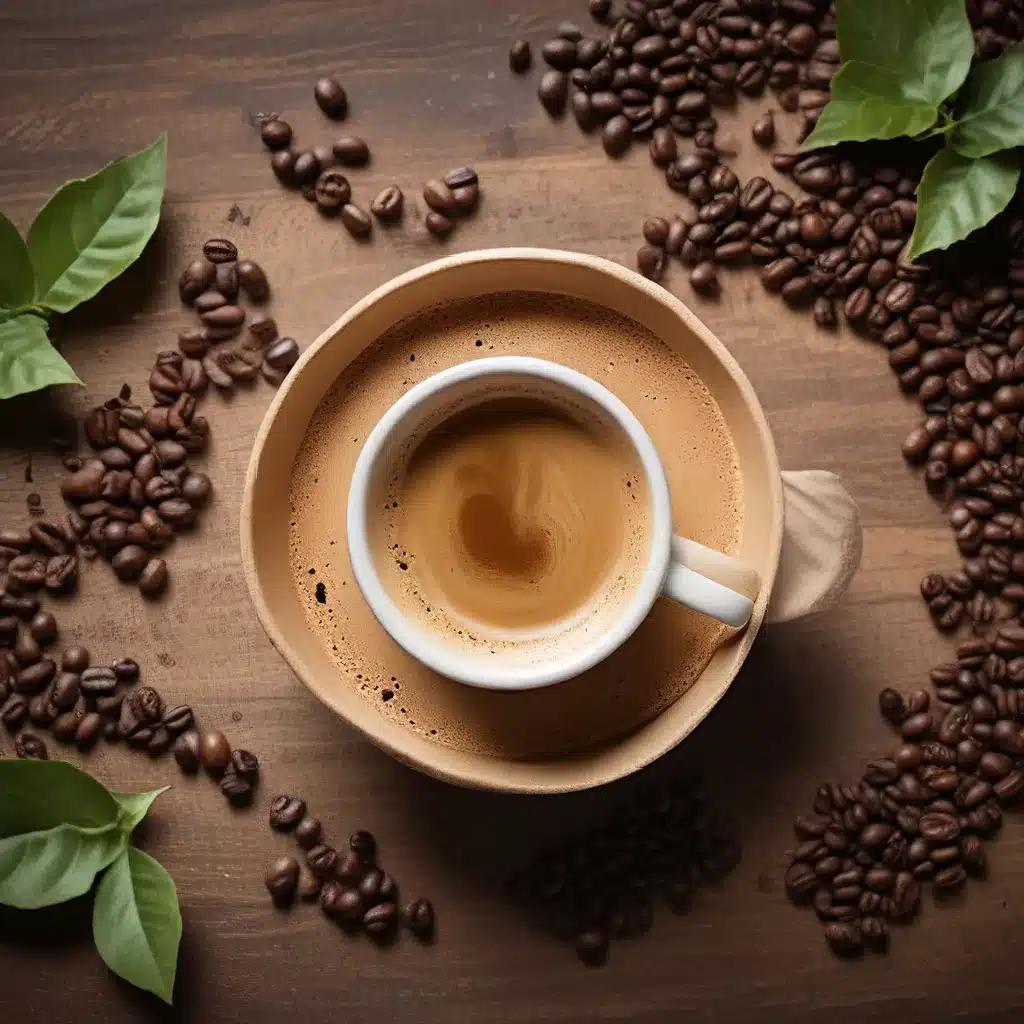
As a self-proclaimed coffee aficionado, I’ve always been intrigued by the art of brewing the perfect cup. But lately, I’ve been asking myself – is my morning ritual doing more harm than good? You see, I’ve recently become acutely aware of the environmental impact of my coffee consumption, and let me tell you, it’s been a real eye-opener.
Embracing Organic and Fair Trade Practices
I’ll admit, I used to be one of those people who just grabbed whatever was on sale at the grocery store, without giving a second thought to where those beans came from or how they were produced. But now, I’m making a conscious effort to seek out organic and Fair Trade Certified coffee. Why, you ask? Well, it turns out that conventional coffee farming methods can be pretty harsh on the environment, with the use of synthetic fertilizers, pesticides, and herbicides polluting our precious waterways and disrupting local ecosystems.
On the other hand, organic coffee is grown without these harmful chemicals, promoting biodiversity and supporting healthier soil. And when I buy Fair Trade Certified beans, I know that the farmers who cultivated them are receiving a fair price for their hard work, ensuring better labor conditions and more sustainable farming practices. It’s a win-win for the environment and the coffee producers.
The Importance of Shade-Grown and Bird-Friendly Coffee
But the sustainability journey doesn’t end there. I’ve also become a big advocate for shade-grown and Bird-Friendly Certified coffee. You see, these methods of cultivation provide natural habitats for a variety of bird and insect species, contributing to the preservation of biodiversity and healthy ecosystems. By choosing these eco-friendly options, I’m doing my part to protect the delicate balance of our natural world, one cup at a time.
Reducing Waste with Reusable Filters and Sustainable Packaging
Now, let’s talk about another crucial aspect of sustainable coffee brewing – the equipment and packaging. Gone are the days when I mindlessly tossed those paper filters in the trash after every use. These days, I’ve invested in a reusable stainless steel, cloth, or gold-tone mesh filter, which not only reduces waste but also enhances the flavor of my brew.
And when it comes to the packaging, I’m on the lookout for coffee brands that prioritize sustainability. I love seeing recycled materials, biodegradable options, and plant-based inks on my coffee bags. It’s a small change that can make a big difference in reducing the environmental impact of my coffee consumption.
Brewing Efficiency and Energy Conservation
But the sustainability journey doesn’t stop there. I’ve also become a bit of an energy efficiency nerd when it comes to my coffee-making routine. Gone are the days of leaving my electric coffee maker running all day long. These days, I opt for manual brewing methods like the French press, AeroPress, or pour-over, which require no electricity at all. And when I do use an electric brewer, I make sure it’s an energy-efficient model with features like automatic shut-off and programmable timers.
Composting for a Greener Garden
And let’s not forget about those used coffee grounds! Instead of tossing them in the trash, I’ve started composting them, turning that nutrient-rich waste into a valuable resource for my garden. The grounds are brimming with nitrogen, phosphorus, and potassium – the perfect ingredients to help my plants thrive. Talk about a win-win situation!
Supporting Green Coffee Shops
As I’ve delved deeper into the world of sustainable coffee, I’ve also made a concerted effort to support green coffee shops – establishments that prioritize eco-friendly practices and environmental responsibility. When I visit these establishments, I know I’m not only enjoying a delicious cup of joe, but I’m also voting with my wallet to encourage more cafes to adopt sustainable practices.
Responsible Consumption Habits
And you know what they say, “With great coffee comes great responsibility.” As a conscious consumer, I’ve adopted a few simple habits to ensure my coffee consumption is as responsible as possible. For starters, I’m mindful of my water usage, ensuring I only brew what I need and avoiding wasteful practices. I also make an effort to support local and small-batch roasters, who often have a lower carbon footprint than the industry giants.
Embracing Sustainable Coffee Initiatives
But my commitment to sustainable coffee doesn’t stop there. I’m also actively supporting various sustainable coffee initiatives that are working to create a more eco-friendly and socially responsible industry. From organizations like the Rainforest Alliance and Fairtrade International to innovative startups pioneering new technologies, I’m doing my part to contribute to the global effort to improve coffee cultivation practices, protect the environment, and support coffee-producing communities.
A Brighter, Greener Future One Cup at a Time
Phew, that’s a lot of information to digest, I know. But the reality is, every eco-friendly choice we make as coffee drinkers can have a profound impact on the future of our planet and the coffee industry as a whole. By embracing organic, Fair Trade, and shade-grown coffee, investing in reusable filters and sustainable packaging, and supporting green coffee shops and sustainable initiatives, we can all play a vital role in promoting environmentally friendly practices.
So, the next time you reach for your morning cup of joe, I encourage you to take a moment and consider the impact of your choices. Because when it comes to coffee, the power to create a brighter, greener future lies in our hands – or rather, our mugs. Together, we can make a difference, one sip at a time.
Sips Coffee House is committed to providing our customers with the most sustainable and eco-friendly coffee options. Visit our website to explore our selection of organic, Fair Trade, and shade-grown coffee, as well as our lineup of reusable filters and sustainable packaging. Let’s brew a better future, one cup at a time.















